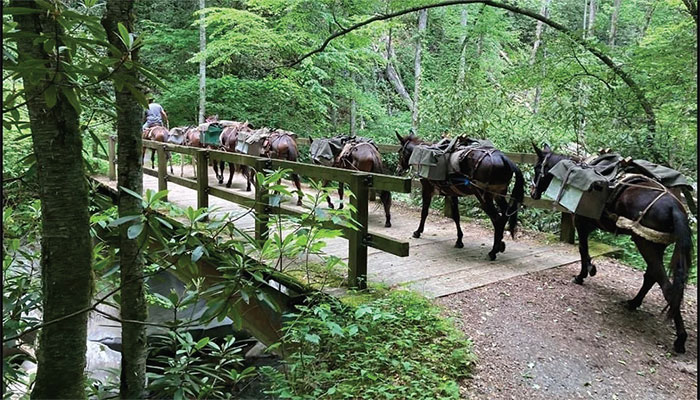|


|
Sandra Myers
|
|
“By faith Noah, being warned of God of things not seen as yet, moved with fear, prepared an ark to the saving of his house; by the which he condemned the world, and became heir of the righteousness which is by faith.”
|
Hurricanes, blizzards, tornados, earthquakes, fires, failing economy, supply chain interruptions, electric grid failure, civil unrest and more—in recent years there has been a significant uptick in events and it doesn’t show signs of letting up. If you wait until you need it, it’s already too late—ask Noah, Joseph, and the ten virgins, five of whom were prepared and five were not. Should you become a “prepper?”
Some have sold their homes, moved to remote locations, stockpiled food, now grow their own crops, live like “pioneers,” and strive to be as independent of the “system” as possible. There is certainly beauty to this idea, since I’m sure we’d all be better off if we eliminated some of our modern distractions and learned to live more simply. But, honestly, I don’t feel led in that direction.
Recent Events and Upcoming Possibilities
I’m not going to go into the nefarious aspects of the most recent tragedies. The purpose of this article is to reflect on what you can do to mitigate disaster recovery. You should apply your preparedness to your own specific location and potential events. When we look at the two most recent hurricanes and examine what worked, what didn’t and the foresight can help you through and our trust in Jesus will take care of the rest.
What Didn’t Work?
Electric, internet, and cell phone service were non-existent. For all the water that fell from the sky, safe drinking water had to be trucked in, except many roads, big and small, were completely washed away or covered by trees or mudslides.
Even if given the benefit of doubt, FEMA and the Red Cross (a quasi-governmental agency, but with less accountability) are still a grotesque failure. Why? Because of the bureaucratic, bloated, slow-moving structure of any government agency. Then, when they do finally arrive, they attempt to assert all authority and everyone else who’s been there from the beginning is supposed to acquiesce and fall in line for the behemoth agency to tell them how to do what they’ve already been doing. Many were ordered to stop their relief efforts.
One example regarding FEMA’s bloated structure: FEMA recently issued a new guide, Achieving Equitable Recovery stating: “The goal of the Equity Guide is to help local officials and leaders incorporate diversity, equity, inclusion, and accessibility (DEIA) in their post-disaster recovery management work.” The Equity Guide provides actionable steps and includes checklists, toolkits, case studies, and community examples on how to incorporate equity throughout the recovery management process and how to work toward achieving equitable outcomes. Yes, DEI has made it to FEMA-relief also.
What Worked?

|
Pack mules head to desperate, hard-to-reach areas.
|
|
Community: close by neighbors and volunteers immediately brought supplies, equipment and more. Means of removing or getting around blockages—from heavy equipment to pack mules—they arrived and got to work. Privately owned helicopters and airplanes whose pilots used their own money and time to drop supplies. All this was in place before FEMA arrived and long before the political photo ops.
Radio communications—CB, GMRS, and amateur (ham) radio are invaluable. I followed one local ham radio net in Rutherford County, North Carolina who became a central hub of directing logistics and needs such as food and water distribution areas; medical needs; finding shelter; rescues; wellness reports; giving traffic updates regarding road closures; equipment needed.
What else worked? Gas generators; gas chain saws; stored food and water; and cash. Even when stores started to reopen, if the electricity and/or cell service was still down there was no way to process credit card charges.
Applying These Lessons
Prepping can seem overwhelming. But if we take a rational approach, we realize that the whole point of prepping is to survive a crisis event, as well as to better recover from major life disruptions when they do happen. Focus on the things that matter most and remember that simpler is better.
1. Know how to get out of your house, neighborhood, and local area if you need to evacuate for any reason. Know how to turn off your home’s utilities such as gas, water, and electricity if necessary. Some people recommend bug-out bags ready to go with water, water purification tablets, food, personal protection, cash, hygiene products, chargers and cables; and a change of clothes.
2. Gather and keep together important papers for a hasty exit. You may want to have a thumb drive with pictures of your personal papers and other important information.
3. Know your community. Churches, community centers, fire stations, schools and some stores have been gathering areas for resources and information.
4. For families, have a backup communication plan. How will you communicate with family members if cell phones don’t work? Have a designated location to meet, if possible. Or have an agreed place to leave a message, whether it’s with your Aunt Suzy (in another area) or on a social media website.
5. Consider special needs for yourself, pets, infants, seniors, and individuals with disabilities or medications.
6. Just-in-Time Preparations: If I know an event is coming, such as a hurricane or ice storm, I will make sure all of my electronic devices are charged ahead of time and all of my radios, flashlights or candles, and supplies are ready. Before our ice storm of 2021, I filled my bathtub with water for flushing. I had firewood in the garage for the fireplace.
7. For sheltering at home: Some people have generators. I do not. Some people have medical needs that may require a generator. Food: Remember, your local grocery store typically only has about a 2-day food supply at any given time. You might think that I would tell you to buy dehydrated or freeze-dried food. I won’t. Keeping it simple and affordable, you could buy extra of foods that you would readily eat and that requires little or no preparation such as peanut butter, canned meats; canned soups, stews or pastas; canned beans; protein bars. Whatever you buy, it should be part of your normal(ish) diet so that you can rotate the foods on your shelf eliminating potential expired food supplies and waste. Water—at least a gallon per adult per day.
8. Get to know your neighbors during non-emergency times: Be aware of the talents and specialties of your neighbors (mechanic, electrician, doctor, nurse, plumber, builder, etc.) And share yours also. It’s great to support each other.
Preparing to weather these events does not discount our trust in God to see us through. Rather, you are seeing to the safety and surety of your family by the means and direction that God has given you.
The Ultimate and Most Important In Preparedness
Our Holy Bible gives examples and warnings of diverse situations: floods, famines, wars, pestilences, earthquakes, fire from the sky, shaking of the heavens and earth and more. Through any of these, we desire to save our families and be overcomers.
Finally, the worst disaster of all is separation from God. For this, too, we can prepare: Jesus is our Salvation. We must keep our lamps full and wicks trimmed, and to be on alert and ever watchful. This is not an idle activity, we must actively guard our hearts by rejecting worldly traps (sometimes appearing to be spiritual); draw closer to Him by prayer, with study and meditation on His Holy Word; living our personal relationship outwardly and putting on the whole armour of God. 
|
![]()
![]()
![]()
![]()
![]()